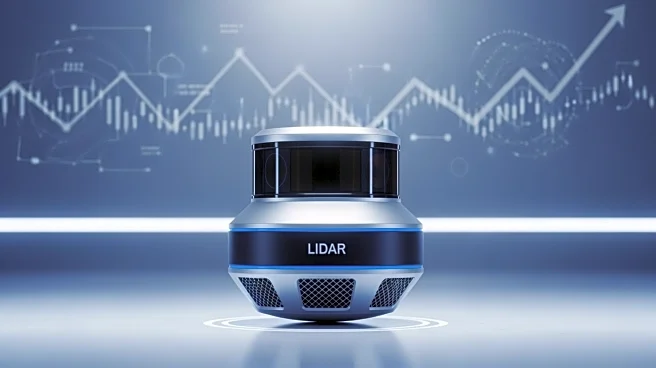What's Happening?
Luminar Technologies, a company specializing in long-range automotive LiDAR, experienced a significant stock surge of approximately 31% on October 25, 2025. This increase in stock value, reaching around $2.22, was driven by a combination of a broad tech
stock rally and speculation regarding a potential buyout. Former CEO Austin Russell has proposed a plan through his Russell AI Labs to acquire all of Luminar's Class A shares and potentially merge it with another automotive tech company, creating a 'Luminar 2.0' platform. This proposal, although non-binding, has sparked investor interest. Luminar's recent financial performance includes a Q2 2025 revenue of $15.6 million, a 5% year-over-year decrease, and a GAAP net loss of $30.5 million. The company has also revised its 2025 outlook, reducing expected lidar unit shipments and revenue projections.
Why It's Important?
The developments at Luminar Technologies are significant for the broader LiDAR and autonomous vehicle industries. The company's partnerships with major automotive manufacturers like Volvo and Mercedes-Benz highlight its strategic position in the market. The proposed buyout and merger could potentially enhance Luminar's capabilities and market reach, impacting its competitive stance. However, the company's financial challenges, including missed earnings forecasts and reduced guidance, underscore the risks involved. The LiDAR industry is poised for growth, with increasing adoption in autonomous vehicles, but competition remains fierce. Luminar's ability to capitalize on its technological advancements and strategic partnerships will be crucial for its future success.
What's Next?
Investors and industry analysts will closely monitor Luminar's upcoming Q3 2025 earnings report, scheduled for November 13, 2025. This report will provide further insights into the company's financial health and operational progress. Additionally, the market will watch for any developments regarding the proposed buyout and merger plan. Luminar's ability to execute on its partnerships and product roadmap, including the rollout of its next-generation 'Halo' LiDAR chip, will be critical in determining its future trajectory. The company's performance in the coming months will likely influence investor sentiment and its stock valuation.
Beyond the Headlines
The potential buyout and merger of Luminar Technologies could have broader implications for the LiDAR industry, particularly in terms of consolidation and technological innovation. As the autonomous vehicle market evolves, companies like Luminar that can offer advanced, cost-effective solutions may gain a competitive edge. However, the industry's reliance on partnerships with major automotive manufacturers means that any shifts in these relationships could significantly impact Luminar's business. Additionally, the company's financial challenges highlight the importance of strategic financial management in navigating the competitive landscape.
















